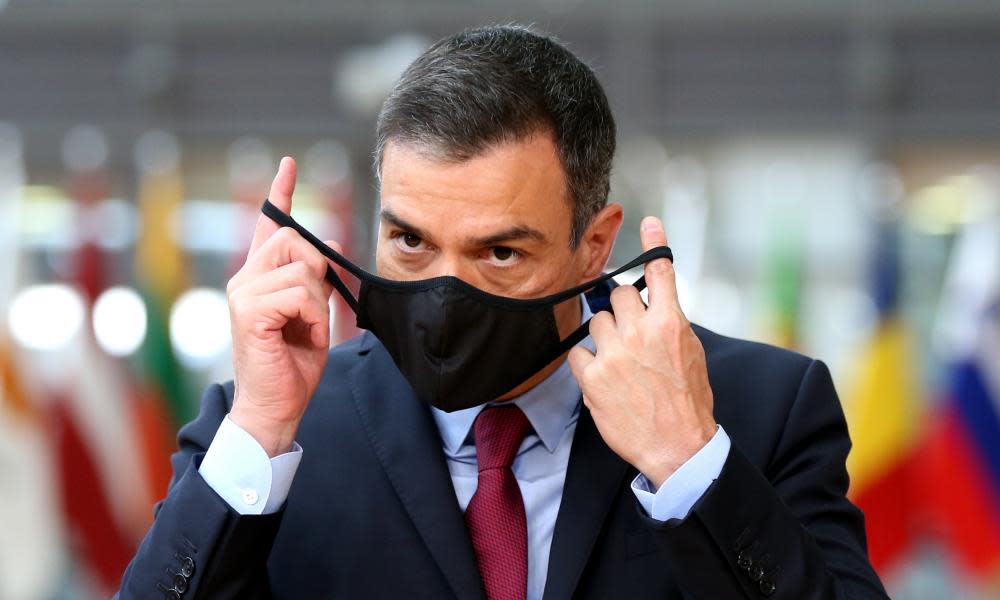The conditions for a coronavirus spike in Spain were clear. Yet no one saw it coming

Spain’s socialist prime minister, Pedro Sánchez, provided a reassuring contrast to the buffoonery of Boris Johnson and Donald Trump during the early months of the Covid-19 pandemic. When he forced the country into a harsh mid-March lockdown, he freely admitted mistakes had been made.
Spaniards were prepared to pardon. But, just as Americans cannot forgive Trump for leading the United States into a double-bump pandemic, so a sense of anger is building as Spain’s triumphant “defeat” of coronavirus threatens to become merely a brief holiday.
New daily cases here have jumped to three times the level in Britain and show a steep progression. In the worst-hit areas, partial lockdowns are being reinstated, with the Catalan regional premier, Quim Torra, talking of a “critical situation” and threatening the harshest lockdown measures available to him within days. “I don’t want another 7,000 deaths,” he said. Community contagion – when nobody knows who is infecting who – is reportedly back in some parts.
Related: The Spain quarantine decision shows No 10 is still in coronavirus panic mode | Simon Jenkins
Travellers arriving in the UK from Spain must now observe two weeks’ quarantine, even if the Spanish government insists this is wrong. “Spain is a safe country,” said the foreign minister, Arancha González Laya, adding that isolated outbreaks were expected and under control.
In terms of deaths, she is right. Britain has 20 times as many daily Covid-19 fatalities, over a seven-day average, but that is likely to change. The situation worsens daily and, with the UK’s new quarantine rule, economic damage has already been done.
Spain’s return to freedom in June after one of the world’s toughest lockdowns brought joyous declarations that it was open to tourists. The aim was to save the summer season in a country where tourism accounts for 12% of GDP.
Spain welcomed 84 million visitors last year, one in five from the UK. As the axe falls on that, the season is already lost – while self-contained archipelagos such as the Canary and Balearic islands (where infection rates are lower than the UK) plead to be treated differently. Yet now Spain is entering a holiday period when people will scatter from cities and mix at beach resorts before returning home late in August. There is potential, in other words, for things to get worse.
After suffering one of the world’s highest Covid-19 death rates (rivalled only by Britain), Spaniards have a right to know what has gone wrong. Young people are an easy scapegoat, since summer nightlife breaks an otherwise sensible and cautious approach to the virus. In fact, coronavirus is once more exposing more serious, ingrained problems.
Spain is divided into 17 largely self-governing autonomous regions, which each administer health, education and other key services. Quality varies and they do not always share data or report cases in the same way. They are nevertheless responsible for tracking and tracing.
González Laya claims the system is working, but anecdotal evidence points to failures. A week ago, when El País newspaper investigated, regions such as Madrid and Catalonia had just one Covid-19 “scout” per 30,000 inhabitants – six times fewer than Germany. Catalonia has since doubled the number.
The Catalan government blamed Sánchez for the March outbreak, but may now be one of the first to lose control. The densely populated town of L’Hospitalet is back in a “voluntary” lockdown. Zaragoza, the capital of neighbouring Aragon, has likewise imposed restrictions.
Meanwhile the migrant workers who pick Spanish fruit and vegetables live in sometimes crowded, shabby and abusive conditions, which have long gone ignored. Those conditions are a perfect Covid-19 breeding ground.
Since many labourers are young and fit, they are often asymptomatic ; they follow the harvests from soft fruits in Aragon and Catalonia, to citrics in Valencia and olives in Andalucía. Itinerant workforces are key to Spain’s rural economy. Yet nobody saw it coming.
It is a relief that Spain’s armed forces are now being trained to test and trace. During the first wave, the Military Emergencies Unit stepped in when the pandemic overwhelmed care homes. Its personnel cleaned, disinfected, taught staff how to respond and carted away the dead.
The government will offer military trackers to regional authorities. Some may take this as an insult to local pride, though one hopes that saving lives, and the economy, will trump petty politicking. If that doesn’t happen, Spain risks an autumn return to a state of emergency, with central government taking control once more.
Spaniards showed discipline, solidarity and compassion the first time around. Next time, they will be less patient.
• Giles Tremlett is a correspondent based in Spain. He is the author of Ghosts of Spain, and biographies of Catherine of Aragon and Isabella of Castile


